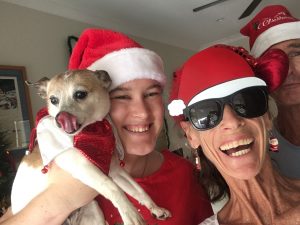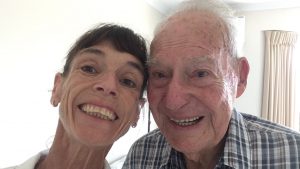We have started a new year, a new decade and a new appreciation program for Physiopedia. Every month Physiopedia will highlight one of the deserved workers (volunteers) for their outstanding contributions. To find out more about our new award program, click here!
The first Monthly Award has the honor of being awarded: Lucinda, our top employee for January 2020!
Physiopedia is very pleased that you are doing great things, Lucinda. Well done and congratulations!
Questions and Answers with our very first award winner!
Your name: Lucinda Hampton
Time active with Physiopedia: I loved exploring the website before officially completing the volunteer course in January 2019. It's been a year!
Current role at Physiopedia: I love all aspects of Physiopedia. Review courses, edit pages, create pages, find links to pages, and discover new pages. (Become voluntary to do this yourself!)
Where did you go to school? Melbourne University and Lincoln Institute of Health Sciences, both in Melbourne, Australia.
Where do you work? Australia. In the northeast of the beautiful state of Queensland (QLD). I now work pretty much full time in home health. I see the full range of diseases: motoneuron disease (MND), cerebral palsy (CP), diabetes, chronic health care, musculoskeletal system (MSK), post-operative surgical care, post-stroke rehabilitation and help for frail older people to still live in theirs houses.
Describe your role (clinical / field work / research / science etc.): I work in the customer's house. I have an extremely mixed fall load. On a typical day, I leave my home at 7:30 a.m. and travel around the sunlit coast in Queensland to see my customers for 30 minutes each. I see older people helping them to continue living in their own homes. This can result in me giving them a home exercise program and doing the Otago exercise programs at home with them if they can. Otherwise, I do simpler exercises such as sitting to stand, gait training, posture training. I may also work with them on the musculoskeletal system (MSK) to help them with osteoarthritis joints or after joint replacement. I also see many diabetic clients and help them with exercise programs that I oversee at home. I often provide and recommend walking aids to clients along with aids to help them with their daily activities. I often do postural examinations and help people with their sitting and sleeping needs. I also see people with new neuronal disorders. I will help them with the exercises and strengthen stretching where appropriate, regardless of which treatment is best for this client. I am always at my fingertips. I was trained in Maitland fashion and use Maitland a lot. Sometimes I see children (e.g. with cerebral palsy) and treat them in the typical way that physiotherapy does. I also see clients with dementia. I see a lot of patients who need conditioning and atrial fibrillation. I often treat patients with chronic obstructive pulmonary disease (COPD) in the chest and often teach them to actively control their breathing technique. I meet many people who need help treating their edema. Sometimes I see people with Down syndrome. Basically, I can see what types of pathologies and restrictions apply to the local doctors, or the outpatients talk about physiotherapy.
What is the most rewarding part of a PT? Can help people overcome health problems. Inspire you with hope. Help people to function better in their environment. Educate people about the best ways to take control of their health.
What are the more difficult aspects when you are a PT? Educate clients about their role. Working with a "team" when choosing an approach at home. Helping older people to cope with old age problems and recognizing that it is difficult for some people with health problems to be old.

What are some of your professional passions? Communicating the importance of movement within people and promoting positive perspectives. Attitude issues, especially in today's technical society and the challenges of the obesity epidemic.
What are some of your personal passions? Oh many! On weekends you can swim, bike, walk, talk to my family and dog in our beautiful coastal parks, go to local farmers markets and have a chat with the staff in my cafe in the evening, to name just a few. Basically, life is a passion!
What do you advise a new physiotherapist to do? Accepting challenges. Always take the opportunity to ask questions. Keep learning, because that makes the work much more interesting. Face different customers and conditions. Only know your calling when you have tried everything!
Where do you see yourself in 5 years? Who knows!
What are the best features of being a volunteer at Physiopedia (PP)? It helps me in my quest for knowledge with a large group that helps endlessly and keeps you busy.
How did it help you to develop professionally as a Physiopedia volunteer? I go into resources and the latest topics and research results. As a volunteer, I am always up to date on most questions.
What are your hopes and wishes for Physiopedia? I love Physiopedia and I love his ideas. But I leave the whole thing up to managers who can network.
What is your favorite course Physioplus ? What I'm doing is always my favorite. So right now it's the one with non-specific neck pain and an Aussie on board. My daughter studied at the University of Queensland (UQ).
Do you have anything else to say? Love the whole concept of learning for everyone! And it's all free. Physiopedia has the best career  courses for development courses and they don't set you back by a month's wages!
courses for development courses and they don't set you back by a month's wages!
Please join the Physiopedia team and supporters and thank Lucinda for her hard work and determination. If you're reading and appreciating a Physiopedia page, chances are Lucinda checked it! Well done!